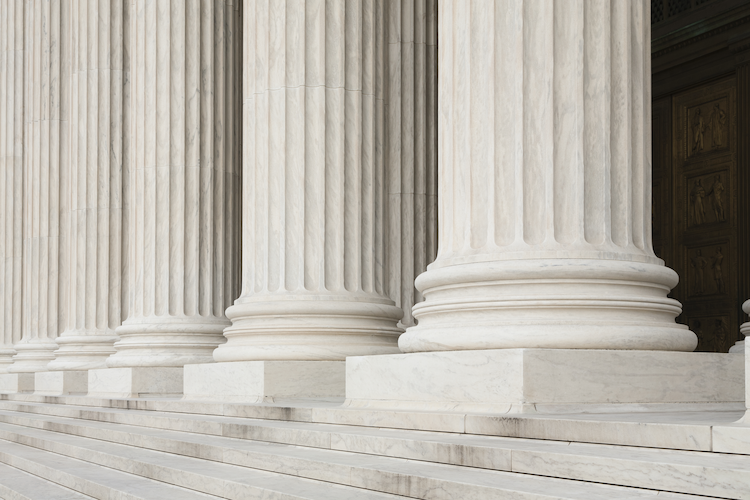What’s on Tap: Supreme Court to Consider Landmark Affirmative Action Cases

When the U.S. Supreme Court begins its new term next month, the justices will hear two potential landmark cases involving affirmative action. Both cases, Students for Fair Admissions v. President & Fellows of Harvard College and Students for Fair Admissions v. University of North Carolina, involve the use of race in the undergraduate admissions process.
The cases were initially consolidated for oral argument. However, following the addition of Justice Ketanji Brown Jackson, who must recuse herself from the Harvard case because she served on the university’s board of overseers, the two cases were decoupled so that Justice Jackson may consider the University of North Carolina dispute.
Conservative Majority Poised to Reverse Course
The primary issue in both cases is whether the Court should reverse its decision in Grutter v. Bollinger, 539 U.S. 306 (2003). In the 2003 decision, the Court held that the University of Michigan Law School’s race-sensitive admissions program was narrowly tailored because the consideration of race was merely one factor in the decision-making process and individualized consideration was given to each applicant.
The composition of the Court has changed dramatically since it last upheld the use of affirmative action in Fisher v. Univ. of Tex. at Austin, an opinion which was authored by recently retired Justice Anthony Kennedy. In agreeing to revisit Grutter v. Bollinger, the Court’s conservative majority appears poised to overrule the landmark decision and ban the use of race-conscious admissions programs.
Issues Before the Supreme Court
Both cases involve long-running disputes brought by Students for Fair Admissions, whose mission is to “restore colorblind principles to our nation’s schools, colleges and universities.” In the Harvard case, the group contends that the university’s admissions policy discriminates against Asian American applicants, putting them at a disadvantage as compared to white, black, or Hispanic applicants. In the UNC case, Students for Fair Admissions allege that the university’s consideration of race in its admissions process runs afoul of both Title VI and the 14th Amendment’sequal protection guarantees (which apply given UNC’s status as a public institution).
In both cases, the lower courts upheld the admissions policies, and Students for Fair Admissions appealed. The Court granted certiorari and will hear oral arguments on October 31, 2022. In Students for Fair Admissions Inc. v. President & Fellows of Harvard College, the justices have agreed to consider the following questions: (1) Whether the Supreme Court should overrule Grutter v. Bollinger and hold that institutions of higher education cannot use race as a factor in admissions; and (2) whether Harvard College is violating Title VI of the Civil Rights Act by penalizing Asian American applicants, engaging in racial balancing, overemphasizing race and rejecting workable race-neutral alternatives.
The issues before the Court in Students for Fair Admissions v. University of North Carolina are: (1) Whether the Supreme Court should overruleGrutter v. Bollingerand hold that institutions of higher education cannot use race as a factor in admissions; and (2) whether a university can reject a race-neutral alternative because it would change the composition of the student body, without proving that the alternative would cause a dramatic sacrifice in academic quality or the educational benefits of overall student-body diversity.
Previous Articles
SCOTUS Decision in Bowe v. United States Is First of the 2026 Term
by DONALD SCARINCI on February 5, 2026
In Bowe v. United States, 607 U.S. ___ (2026), the U.S. Supreme Court held that Title 28 U.S.C. § ...
SCOTUS Rules State Can’t Immunize Parties from Federal Civil Liability
by DONALD SCARINCI on January 29, 2026
In John Doe v. Dynamic Physical Therapy, LLC, 607 U.S. ____ (2025) the U.S. Supreme Court held that...
Supreme Court to Address Racial Discrimination in Jury Selection
by DONALD SCARINCI onWhile the U.S. Supreme Court has concluded oral arguments for the year, it continues to add cases t...
The Amendments
-
Amendment1
- Establishment ClauseFree Exercise Clause
- Freedom of Speech
- Freedoms of Press
- Freedom of Assembly, and Petitition
-
Amendment2
- The Right to Bear Arms
-
Amendment4
- Unreasonable Searches and Seizures
-
Amendment5
- Due Process
- Eminent Domain
- Rights of Criminal Defendants
Preamble to the Bill of Rights
Congress of the United States begun and held at the City of New-York, on Wednesday the fourth of March, one thousand seven hundred and eighty nine.
THE Conventions of a number of the States, having at the time of their adopting the Constitution, expressed a desire, in order to prevent misconstruction or abuse of its powers, that further declaratory and restrictive clauses should be added: And as extending the ground of public confidence in the Government, will best ensure the beneficent ends of its institution.





